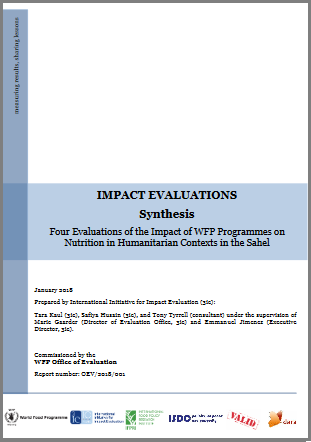
Evaluations were commissioned by the WFP Office of Evaluation and were managed by the International Initiative for Impact Evaluation’s (3ie). They form a part of the Humanitarian Assistance Thematic Window, which was launched in 2014 with the overall objective of generating high-quality policy-relevant evidence for improving the quality of life of those in humanitarian crises.
While the impact evaluations highlight specific recommendations for a variety of stakeholders in each of the four countries, there are also some broad operational and policy related lessons: 1) greater attention to the timing, sequencing, and roll out schedule of the package of interventions is likely to result in enhanced effectiveness; 2) closer partnership and coordination can support more effective and efficient delivery; 3) barriers to achieving better programme coverage and access include physical distance to health centers, community sensitization and screening and 4) data are problematic, both in terms of its absence, but also, where it is available, in terms of its form, status, and accessibility as a public good.
The synthesis report also draws recommendations which are closely aligned with the four main lessons. The recommendations span policy, operational, and technical aspects of WFP programmes and interventions.
